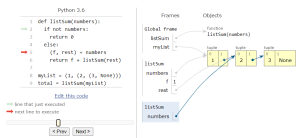Compilers Handle Long-Running Processes
Online Python compilers allow you to write, compile and execute python code in your browser without the need for local installations or extra software. These tools are ideal for learning python, as you can experiment with your code in an environment that is safe from harming your computer or putting anything on it that you don’t want there. You can use a Python online compiler from anywhere with an internet connection, whether it is at work, school or your local coffee shop.
The online Python compilers available will vary in UI and features, but the general process is similar. Most will let you click a button to execute your code, but some will allow you to enter text by hand and others will have a command prompt interface. Once your program is compiled and executed, you will be able to view the results in a window or console.

A compile python online is a piece of software that takes a python program and converts it into a native binary machine code that will run faster than the original python program. This is done by analyzing the python program to determine the different data types that are being used in the program. Then, it uses a technique called Just-In-Time (JIT) to convert these data types into code that will be executed at the same time as the rest of the program. This allows the program to run much faster than if it were being executed by the Python interpreter, which has to deal with these different data types at runtime.
How Online Python Compilers Handle Long-Running Processes
In order to do this, a Python compiler uses a language-specific JIT implementation. The main Python compiler is CPython, which is written in C. However, there are other python compilers that have been developed, such as Numpy and PyPy, which both have their own JIT engines. While these JIT engines are not as fast as CPython, they do provide a significant performance boost over standard Python.
One of the primary reasons that CPython is slow is because it does not perform object management correctly. The rest of the Python programming language relies on a technique called reference counting, which means that each object in the program is tracked by a reference count and the reference count is decremented as the object is manipulated. When the reference count reaches zero, the memory for the object is freed.
This is a simple but effective technique, but it requires that every operation in the program create and destroy a large number of objects in a relatively short amount of time. This can cause the program to stall, or even crash the computer. The online Python compilers that support a JIT compiler will automatically manage the memory for you, reducing the overhead that is required to run your program. This will also make the program more scalable, as it will no longer require that each operation create and destroy a lot of objects at the same time.